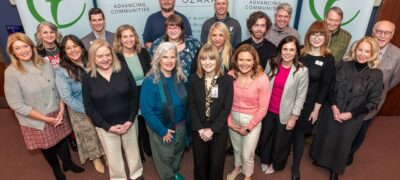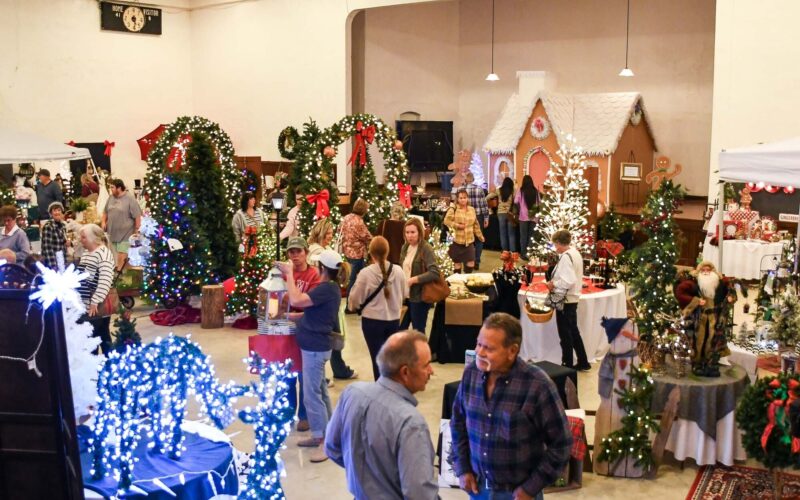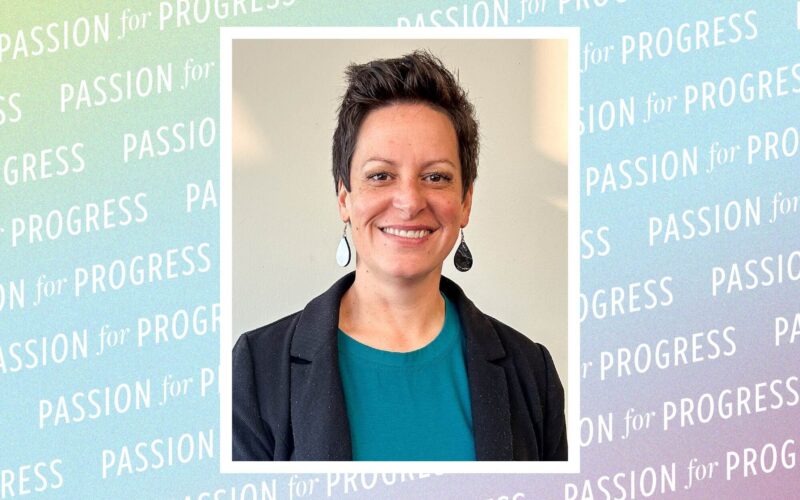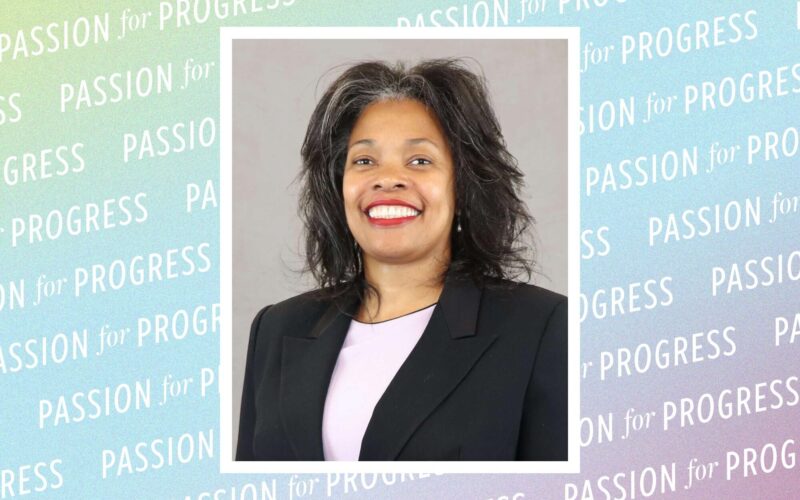Passion & Purpose: Summer 2024
CFO, Coover Foundation distribute $220,000 to support spaces for rural neighbors to gather
A place may be defined by where it is on a map, but also by the links and connections that hold its people together. And in today’s uber-connected world, with technology and messaging and no need to leave the house to find information, people are feeling more disconnected — and lonely — than ever before.
Connections matter. Having spaces to make those meaningful moments is crucial, too. That’s where the Louis L. and Julia Dorothy Coover Charitable Foundation, in partnership with the Community Foundation of the Ozarks, came in to help with the Coover Regional Vibrant Communities Grant Program to address the “epidemic of loneliness” in rural communities.
Through the program, $220,000 was distributed to 14 nonprofits throughout central and southern Missouri to help further their efforts to create community spaces.
“Loneliness levels have reached an all-time high, with nearly half of 20,000 U.S. adults reporting they sometimes or always feel alone,” notes a 2019 article by the American Psychological Association, citing a survey conducted by Cigna.
Loneliness, the article argues, affects more than one’s mental health: “Social isolation and chronic loneliness place individuals at much greater risk for a variety of diseases, as well as for premature mortality.”
The bottom line: There’s a lot tied up in feeling alone, and that’s where the CFO and the Coover Foundation have stepped in to help.
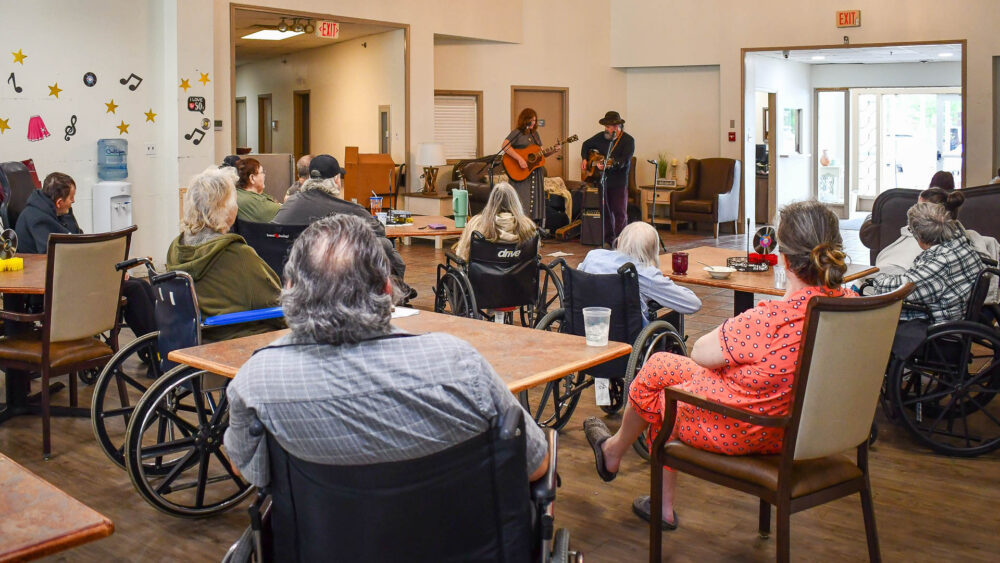
The Creek Rocks shared their original songs and traditional Ozarks tunes with residents of Truman Healthcare & Rehabilitation in Lamar. The performance was funded by a recent Coover Regional grant to Singer Hill Miracle of Music.
“For the past couple of years, the Coover grantmaking program has focused on improving spaces for people to gather,” said Ashley Fleming, grant program officer for the CFO, at a grant presentation on April 30. “In the wake of the COVID pandemic, it’s been important to rebuild the spaces where people gather, where people collaborate and where people make connections.”
The funded projects are wide in scope and physical place, ranging from wellness events for breast cancer survivors and their caregivers to the purchase of a dishwasher and ice machine for a senior center.
Since the Coover Foundation began distributing funds, more than $8 million has benefitted rural communities, said Jill Reynolds, senior vice president at Commerce Trust and chair of the Coover Foundation grant selection committee.
“This is a big deal,” Reynolds said at the grant presentation, and spoke of Julia Coover, who helped create the foundation years ago. “I just know Mrs. Coover would be smiling and so grateful to see all of the good that has come from this. It’s so impactful, and it’s going to go on for years and years.”
Here are just two of their stories.
Connecting through Song
Tucked away on a gravel road near the Dade-Barton county line is the Singer Hill Miracle of Music, a house concert series that began bringing friends, family and neighbors together monthly, in the middle of farmland, more than a decade ago.
That mission expanded recently through additional concerts at other local venues like schools and nursing homes — an effort that again will grow through a $11,640 grant from the Coover Foundation.
“The Coover Foundation grant allows me to build on this foundation that we already have established to reach out into new areas,” says Carl Singer, who leads the effort. “For instance, I have about 40 to 50 people usually at our Tuesday night monthly concerts. I can’t hold any more than that in my house.”
Thanks to the grant, they can give additional performances — benefiting additional people, and providing additional compensation to the musicians.
“The hope is that we can reach out into other parts of our general community with the same artist,” says Singer. “Our artists have already come into the house concerts, and they get a little extra money. They are delighted to do that.”
Singer Hill began as a mission: It was because of Kay Singer, Carl’s late wife, who needed a project to focus on as she navigated some health challenges. The couple began the concert series in their home, setting up chairs that cascade through their living room, kitchen and sunroom — a setting that’s accentuated by Carl Singer’s stained-glass and mosaic art. To date, the series has offered more than 100 concerts in the Ozarks countryside, giving a reason for people to get together.
“I think there is a temptation to just stay at home,” says Mary Peirot Jones, a frequent attendee who helps with social media for the series.
“For me, what has been fulfilling is meeting other people who live around here,” she says. “It’s low-key — bring a snack, bring a donation, and catch up with people.”
These performers may be from across the country — or from relatively right down the road, as was the case at a recent concert with The Creek Rocks from Springfield. Husband-and-wife duo Mark Bilyeu and Cindy Woolf sang original folk songs and those found in other legacy collections.
“We like to sing songs we find from different Ozarks folk singers in Missouri and Arkansas,” said Woolf as the concert began, giving examples of collectors Mary Celestia Parler and Max Hunter.
The evening concert wasn’t the first the duo played that day. In light of the new grant funding, they also sang at two nursing homes: Good Shepherd in Lockwood — which has already hosted some Singer Hill concerts funded by the Lockwood Community Foundation, a CFO affiliate — and Truman Healthcare & Rehabilitation in Lamar.
Residents at the Lamar nursing home filled the dining area as the duo began to play. Toe-tapping, clapping and even some dancing led to success without words other than the ones that were shared by the musicians.
As they finished their set, its success was evident in a staff member’s conversation with a resident: “We’ll have to tell them to come back and see us!”
Using Art to Heal and Connect
Art is at the heart of mission-minded work being done in West Plains, the seat of Howell County and home to about 12,000 people. Despite its size, which is larger than most surrounding communities, there is limited access to mental health therapy — and a lingering stigma, says Stacy Magdalena Tintocalis, executive director of Heart of the Ozarks United Way.
“I know therapy is nonexistent in this town,” Tintocalis. “People are probably fearful of therapy. I was thinking that maybe people who are fearful of therapy would come here instead of going to a doctor’s office, thinking this is not therapy, it’s something else.”
Here, in this case, is the Yellow House, a nearly 125-year-old, gingerbread-style house that, yes, is painted a bright shade of yellow. It’s a community arts center, and part of the focus of a $14,107 grant from the Coover Foundation to fund the Conversation Starters program. The joint effort of the United Way, the Yellow House and Ozarks Artery, a nonprofit that encourages creativity, will provide mental health workshops and public art events that fundamentally tie to merging self-help with community good.
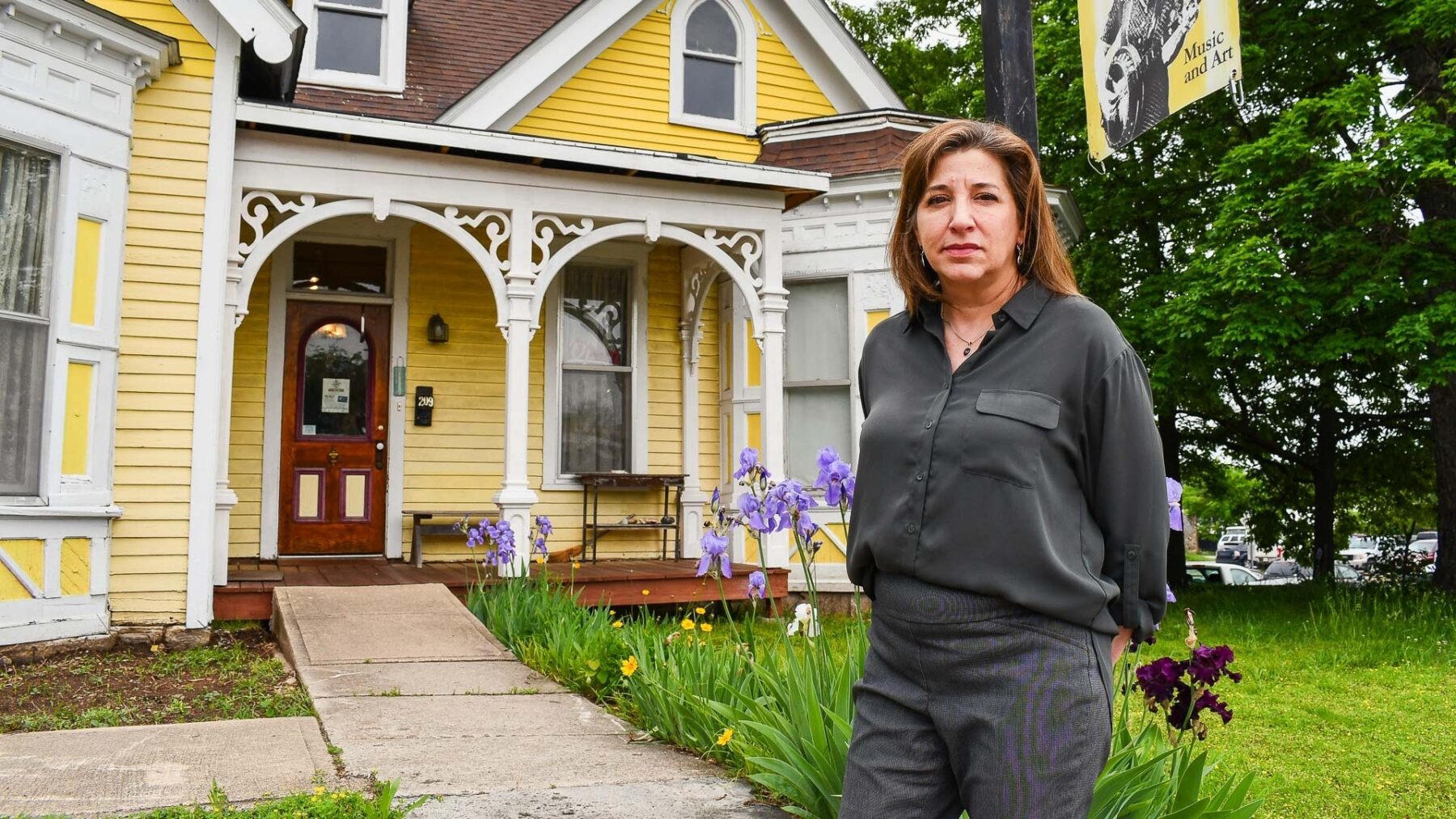
Stacy Magdalena Tintocalis, executive director of Heart of the Ozarks United Way, partnered with the Yellow House in West Plains to secure a Coover Regional grant for art therapy programming that builds community.
Several elements make up this Conversation Starters program. One is a community mural. Another is a juried art show, which will help prompt discussion among program participants. As its website puts it in its call for submissions, “Therapy participants will use the artworks you create to induce socializing.”
A third, key element are the sessions themselves, which merge art and group therapy. Sessions — for adults and kids — will be structured differently, but ultimately tie to using art to start a conversation and process challenges participants face.
“When we go to the art shows Ozarks Artery has, people — strangers — stand around and talk to each other,” Tintocalis says. “I think it’s the only place where strangers talk to strangers, and there’s no barriers. There’s no feeling of, ‘Oh, I shouldn’t be talking to you.’ It’s not like the supermarket. It’s like, ‘I’m supposed to be turning to somebody and talking to them about this artwork.’”
Although not directly part of the grant, another goal of this program is to increase visibility and interaction with the Yellow House. The house dates to 1903 and was donated for local arts use, which today manifests through the distinctive structure and a guiding nonprofit.
“There’s this concept known as the ‘third space’ or ‘third place,’ and it’s disappearing,” says Tracy Fenske, a Yellow House board member, of having a place besides work and home to connect with others. “Providing a third space is an awesome opportunity because they’re just dying everywhere, but especially in small towns and especially here.”
Despite its longtime tenure in the community, organizers hope that the Yellow House can develop into a place of meaning for even more people.
“I think people can return,” Tintocalis says. “There’ll be so many different events here. They’ll be on shows. There’s music, there’s theatrical things. So hopefully people will come back for that.”
By Kaitlyn McConnell · This essay is featured in the summer 2024 edition of Passion & Purpose: The CFO Magazine.
